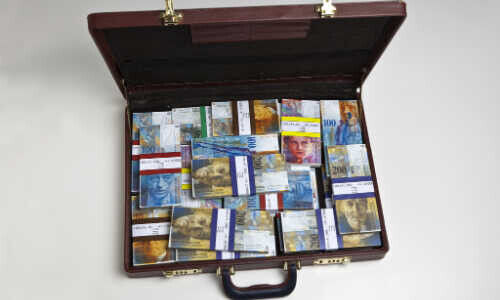A sluggish Swiss response to PDVSA and a stalled revision of money rinsing laws don't bode well for a looming exam. Switzerland's warm embrace of cryptocurrencies add yet another potential avenue for criminals to launder money.
2020 wasn’t a great year for Switzerland’s efforts to rid itself of its reputation as a hotbed of money laundering: a Venezuelan graft scandal, PDVSA, detonated on several Swiss wealth managers, including Julius Baer.
A top Swiss crimefighter chose harsh words for the country’s «Abwehrdispositiv,» or defense plan against illicit money. Daniel Thelesklaf sounded the alarm on his way out after less than one year into the job as Switzerland’s top anti-money laundering official – not a good look.
Regulatory Scrutiny
The ascent of cryptocurrencies adds to Switzerland’s quagmire: last month Finma pinpointed digital assets as an additional money laundering risk for the first time. This comes as U.S. regulators seek to ram through curbs on crypto transactions.
The matter is loaded with urgency for Switzerland, which is weighing approval for Facebook-backed payments system Libra. Concerns over potential graft and money laundering figure into regulatory concerns over Libra, even in the scaled-down version of the scheme, according to a Bern source.
Banking Risks
Cryptocurrencies represent a high risk looming for wealth managers. Two prominent cases involving Russian cryptocurrency shams in recent weeks – one in neighboring France, and the other in Spain – hit close to home.
«Following the trend, more and more Swiss banks are accepting cryptocurrencies, and although they comply with their due diligence requirements, these assets represent significant money laundering risks, especially in connection with cybercriminal activities,» Olivier Beaudet-Labrecque, who is vice-dean of the Institut de lutte contre la criminalité économique (ILCE), told finews.com.
The ILCE is a post-graduate school for fighting economic crime created in conjunction with the Haute ecole de gestion Arc, the University of Neuchatel and Swiss Institute of police.
Banking Hinges on Compliance
Swift, the international payments network, recently warned that criminals are getting in on cryptocurrency as a means to rinse their money– and that the sheer number of digital coins is a major hurdle in tackling the problem. Switzerland's banking sector can ill afford more scandal.
«The stability of Switzerland's banking sector hinges on compliance with the highest anti-money-laundering-standards,» Benjamin Heinrich, primary credit analyst at Standard & Poor’s, wrote in November. He attested that the Swiss regulator had stepped up controls, but warned that future allegations «could lead us to review the sector's market discipline and the effectiveness of its supervision.»
Political Hot Potato
Money laundering is a political hot potato: Swiss parliamentarians tossed around tightening rules on handling graft money. Switzerland’s influential legal lobby has torpedoed efforts to include attorneys and other outside advisers in anti-money laundering rules.
The skirmish matters because Switzerland is going down to the wire on its next review by the FATF, or Financial Action Task Force (an international money-laundering monitoring group). The alpine nation scraped by in 2016, when the 1MDB scandal was exploding – and the wildly larger (in money terms) Venezuelan scandal indicates things haven’t changed much since then.
Dithered On Streamlining
The treatment of 1MDB’s Swiss wealth managers illustrates Switzerland’s still relatively uncharted path on enforcing against them: a court in October sliced 25 million Swiss francs ($29 million) off a landmark 2016 sanction by finance regulator Finma.
Switzerland, which dithered on tightening up its fight against money laundering, still lucked out: the FATF country review that was due next year is likely to be pushed back to 2022. This would give the reticent parliamentarians ample time to pass the revisions required to ensure Switzerland can pass muster in the exam after all – if they would only want to.



































